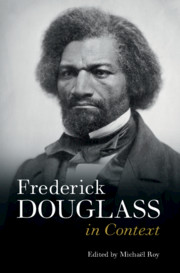Book contents
- Frederick Douglass in Context
- Frederick Douglass in Context
- Copyright page
- Contents
- Illustrations
- Contributors
- Chronology
- Abbreviations
- Introduction
- Part I Places
- Part II Genres
- Part III Activism
- Part IV Philosophy
- Part V Networks
- Chapter 23 The Underground Railroad
- Chapter 24 Colored Conventions
- Chapter 25 Family
- Chapter 26 Correspondence
- Chapter 27 Intertextuality
- Part VI Afterlives
- Further Reading
- Index
Chapter 26 - Correspondence
from Part V - Networks
Published online by Cambridge University Press: 16 June 2021
- Frederick Douglass in Context
- Frederick Douglass in Context
- Copyright page
- Contents
- Illustrations
- Contributors
- Chronology
- Abbreviations
- Introduction
- Part I Places
- Part II Genres
- Part III Activism
- Part IV Philosophy
- Part V Networks
- Chapter 23 The Underground Railroad
- Chapter 24 Colored Conventions
- Chapter 25 Family
- Chapter 26 Correspondence
- Chapter 27 Intertextuality
- Part VI Afterlives
- Further Reading
- Index
Summary
Frederick Douglass’s correspondence emerges in the wake of his self-emancipation and occupies a singular place in nineteenth-century American letters. It is a body of work unprecedented in its scope and its capacity to provide an anchor to the networks of activism in which Douglass wielded such influence. It marks a turn in African American letters in which the epistolary is repurposed as a tool of emancipation and of radical archival practice. His correspondence mobilizes the letter as an instrument of emancipation, able to establish political community and map cartographies of freedom that challenged the limitations placed by the United States on African American autonomy. At the same time, his letters provide a glimpse behind the scenes of a life lived to a great extent in the public eye, confirming the importance of family and home as concrete realities, and of domains of intimacy normally kept out of historical sight.
Keywords
- Type
- Chapter
- Information
- Frederick Douglass in Context , pp. 318 - 328Publisher: Cambridge University PressPrint publication year: 2021

